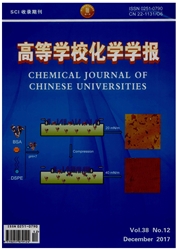

 中文摘要:
中文摘要:
通过分析不同给药剂量硝酸钕[Nd(NO3)3][2,10,50mg/kg(体重)]后,雄性Wistar大鼠完整肝组织的MAS1HNMR谱和肝组织提取物的^1H NMR谱,结合肝组织病理切片图,研究了稀土化合物Nd(NO3)3在大鼠体内的急性生物效应.利用模式识别方法对给药Nd(NO3)3组和对照组大鼠肝组织^1H NMR谱图数据进行了分析.结果表明,腹腔注射Nd(NO3)3后,大鼠肝脏中甘油三酯、亮氨酸(异亮氨酸)、乳酸、丙氨酸、丙酮酸、磷酸胆碱和葡萄糖含量升高,氮氧三甲胺含量降低.肝脏病理图显示,50mg/kg(体重)组大鼠肝细胞可见微小坏死灶和门管区炎细胞轻度增多.推测硝酸钕能影响大鼠肝脏中能量代谢(糖代谢和脂肪代谢)和氨基酸代谢,对大鼠肝脏造成损伤,且其损伤程度随剂量的增加有增强趋势.
 英文摘要:
英文摘要:
The biochemical effects of neodymium nitrate were studied by NMR spectroscopic-based metabonomic approach. Male Wistar rats were treated intraperitoneally with different doses (2, 10 and 50 mg/kg body weight) of Nd( NO3 )3. Liver samples from Nd^3+ -treated rats were analyzed either by 600 MHz ^1H MAS NMR techniques for intact liver or using high resolution (liquid state) ^1H NMR for liver chloroform/water/methanol extracts. All NMR spectra data were analyzed by pattern recognition using principal components analysis. Liver lesions induced by Nd (NO3 )3 were represented by increased triglyceride, leucine (isoleucine), lactate, alanine, pyruvate, phosphocholine and glucose concentration, and reduced trimethylamine N-oxide (TMAO) concentration in liver. Histopathology examination showed cell necrosis and inflammation in the liver of 50 mg/kg body weight dosed rats. It was demonstrated that neodymium nitrate could cause damages to rats liver by disturbing the energy metabolism( glucose and lipid metabolism) and amino acid metabolism in the liver.
 同期刊论文项目
同期刊论文项目
 同项目期刊论文
同项目期刊论文
 Endothelial cell and macrophage regulation of vascular smooth muscle cell calcification modulated by
Endothelial cell and macrophage regulation of vascular smooth muscle cell calcification modulated by Metal-amyloid-beta peptide interactions: a preliminary investigation of molecular mechanisms for Alz
Metal-amyloid-beta peptide interactions: a preliminary investigation of molecular mechanisms for Alz Gadolinium triggers unfolded protein responses (UPRs) in primary cultured rat cortical astrocytes vi
Gadolinium triggers unfolded protein responses (UPRs) in primary cultured rat cortical astrocytes vi Enhancement of lanthanum (iii) on sodium currents in acutely isolated hippocampal CA1 neurons of rat
Enhancement of lanthanum (iii) on sodium currents in acutely isolated hippocampal CA1 neurons of rat Duality of effect of La3+ on mitochondrial permeability transition pore depending on the concentrati
Duality of effect of La3+ on mitochondrial permeability transition pore depending on the concentrati Brain-derived neurotrophic factor protects neurons from GdCl 3-induced impairment in neuron-astrocyt
Brain-derived neurotrophic factor protects neurons from GdCl 3-induced impairment in neuron-astrocyt Impaired mitochondrial function and oxidative stress in rat cortical neurons: Implications for gadol
Impaired mitochondrial function and oxidative stress in rat cortical neurons: Implications for gadol Gadolinium-containing bioparticles as an active entity to promote cell cycle progression in mouse em
Gadolinium-containing bioparticles as an active entity to promote cell cycle progression in mouse em Lanthanum Chloride promoted proliferation with enhanced S-phase entry and inhibited K currents of NI
Lanthanum Chloride promoted proliferation with enhanced S-phase entry and inhibited K currents of NI Studies on the acute biochemical effects of Nd(NO3)(3) by nuclear magnetic resonance-based metabonom
Studies on the acute biochemical effects of Nd(NO3)(3) by nuclear magnetic resonance-based metabonom Lanthanum chloride suppresses hydrogen peroxide-enhanced calcification in rat calcifying vascular ce
Lanthanum chloride suppresses hydrogen peroxide-enhanced calcification in rat calcifying vascular ce Gadolinium-promoted cell cycle progression with enhanced S-phase entry via activation of both ERK an
Gadolinium-promoted cell cycle progression with enhanced S-phase entry via activation of both ERK an A proteomic investigation into the human cervical cancer cell line HeLa treated with dicitratoytterb
A proteomic investigation into the human cervical cancer cell line HeLa treated with dicitratoytterb Cytoskeleton reorganization and FAK phosphorylation are involved in lanthanum (III)-promoted prolife
Cytoskeleton reorganization and FAK phosphorylation are involved in lanthanum (III)-promoted prolife Investigation on Acute Biochemical Effects of Ce( NO3 )3 on Liver and Kidney Tissues by MAS 1H NMR S
Investigation on Acute Biochemical Effects of Ce( NO3 )3 on Liver and Kidney Tissues by MAS 1H NMR S Investigation on the acute biochemical effects of light rare earths on rat serum by NMR-based metabo
Investigation on the acute biochemical effects of light rare earths on rat serum by NMR-based metabo 期刊信息
期刊信息
